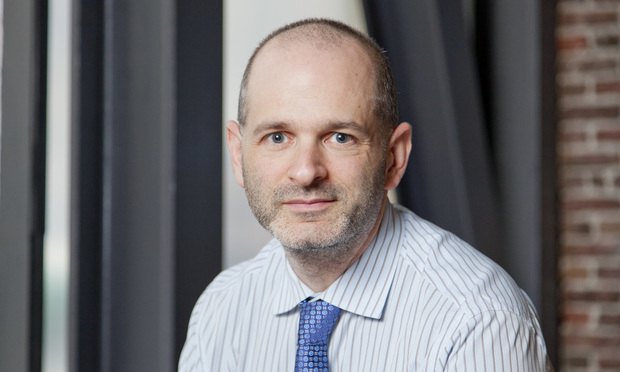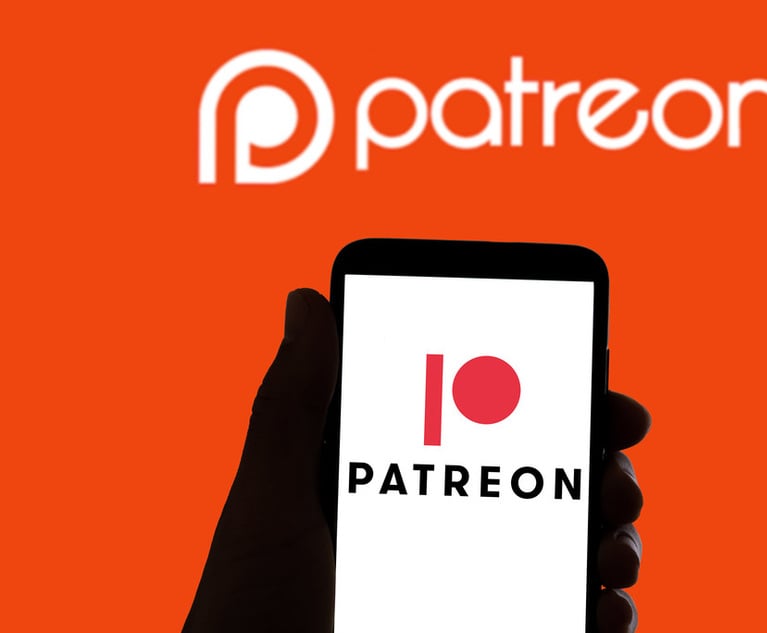Sonos Turns to Orrick and Lee Sullivan for Patent Fight With Google
The home audio company contends that the tech giant has been infringing its patents for more than three years.
January 10, 2020 at 06:25 PM
3 minute read
 Orrick, Herrington & Sutcliffe partner Clement Roberts.
Orrick, Herrington & Sutcliffe partner Clement Roberts.
Sonos Inc. has turned to Orrick, Herrington & Sutcliffe and Chicago's Lee Sullivan Shea & Smith for a patent infringement showdown with Google LLC and parent Alphabet Inc. The New York Times detailed the competitive conundrum the home audio company says its facing here.
Sonos alleges in Los Angeles federal court and at the International Trade Commission that it pioneered the wireless multiroom audio system in the early 2000s. But after partnering with Google Play Music, Google began marketing its own infringing systems, the company says. The infringement is "profoundly compounded by Google's business strategy to use its multi-room audio products to vacuum up invaluable consumer data from users," Sonos contends, enabling Google to sell its products as low-cost loss leaders.
The federal court case has been assigned to U.S. District Judge John Kronstadt of the Central District of California, though it will likely be put on hold pending the ITC litigation, which seeks to block Google from importing allegedly infringing products.
A few additional notes about Sonos' case and its legal team:
➤ The company successfully asserted some of the same patents in Delaware against Denon Electronics and its parent D&M Holdings. Sonos is calling on the same legal team—George Lee, Sean Sullivan, Rory Shea and J. Dan Smith of Lee Sullivan—and is pairing them with Orrick partners Clement Roberts, Jordan Coyle, Bas de Blank and Alyssa Caridis.
➤ Sonos' legal department is helmed by GC Edward Lazarus, author of the 1998 behind-the-scenes look at the Supreme Court Closed Chambers. He served as GC of Tribune Media before joining Sonos a year ago.
➤ Section 101 was a key battleground in the Delaware litigation and Google will likely try a similar attack. Sonos' 8,588,949 patent, for example, claims a controller that provides a user interface allowing for the formation and control of zone players. Denon argued the patent was directed to the abstract idea of controlling audio settings for multiple devices. But U.S. District Judge Richard Andrews of the District of Delaware said that was an oversimplification that ignored "tangible limitations that are tied to specific devices." Sonos eventually won a $2 million verdict and settled the case during posttrial motions.
➤ Sonos went public in August 2018. In its S-1 it cautioned that "we have initiated legal proceedings to protect our intellectual property rights, and we may file additional actions in the future." The company specifically highlighted its litigation with Denon. But it didn't mention that it was getting crosswise with the world's fourth-largest technology company. The federal court complaint now spells out that as early as October 2016, "Sonos put Google on notice of infringement of 28 Sonos patents," and that "later in January 2018, and then again in July 2018, Sonos put Google on notice of infringing even more Sonos patents."
This content has been archived. It is available through our partners, LexisNexis® and Bloomberg Law.
To view this content, please continue to their sites.
Not a Lexis Subscriber?
Subscribe Now
Not a Bloomberg Law Subscriber?
Subscribe Now
NOT FOR REPRINT
© 2025 ALM Global, LLC, All Rights Reserved. Request academic re-use from www.copyright.com. All other uses, submit a request to [email protected]. For more information visit Asset & Logo Licensing.
You Might Like
View All
'A Death Sentence for TikTok'?: Litigators and Experts Weigh Impact of Potential Ban on Creators and Data Privacy

‘Extremely Disturbing’: AI Firms Face Class Action by ‘Taskers’ Exposed to Traumatic Content
5 minute read

Patreon Hit With Lawsuit for Allegedly Diverting Subscriber Data to Meta
Law Firms Mentioned
Trending Stories
- 1South Florida Attorney Charged With Aggravated Battery After Incident in Prime Rib Line
- 2'A Death Sentence for TikTok'?: Litigators and Experts Weigh Impact of Potential Ban on Creators and Data Privacy
- 3Bribery Case Against Former Lt. Gov. Brian Benjamin Is Dropped
- 4‘Extremely Disturbing’: AI Firms Face Class Action by ‘Taskers’ Exposed to Traumatic Content
- 5State Appeals Court Revives BraunHagey Lawsuit Alleging $4.2M Unlawful Wire to China
Who Got The Work
J. Brugh Lower of Gibbons has entered an appearance for industrial equipment supplier Devco Corporation in a pending trademark infringement lawsuit. The suit, accusing the defendant of selling knock-off Graco products, was filed Dec. 18 in New Jersey District Court by Rivkin Radler on behalf of Graco Inc. and Graco Minnesota. The case, assigned to U.S. District Judge Zahid N. Quraishi, is 3:24-cv-11294, Graco Inc. et al v. Devco Corporation.
Who Got The Work
Rebecca Maller-Stein and Kent A. Yalowitz of Arnold & Porter Kaye Scholer have entered their appearances for Hanaco Venture Capital and its executives, Lior Prosor and David Frankel, in a pending securities lawsuit. The action, filed on Dec. 24 in New York Southern District Court by Zell, Aron & Co. on behalf of Goldeneye Advisors, accuses the defendants of negligently and fraudulently managing the plaintiff's $1 million investment. The case, assigned to U.S. District Judge Vernon S. Broderick, is 1:24-cv-09918, Goldeneye Advisors, LLC v. Hanaco Venture Capital, Ltd. et al.
Who Got The Work
Attorneys from A&O Shearman has stepped in as defense counsel for Toronto-Dominion Bank and other defendants in a pending securities class action. The suit, filed Dec. 11 in New York Southern District Court by Bleichmar Fonti & Auld, accuses the defendants of concealing the bank's 'pervasive' deficiencies in regards to its compliance with the Bank Secrecy Act and the quality of its anti-money laundering controls. The case, assigned to U.S. District Judge Arun Subramanian, is 1:24-cv-09445, Gonzalez v. The Toronto-Dominion Bank et al.
Who Got The Work
Crown Castle International, a Pennsylvania company providing shared communications infrastructure, has turned to Luke D. Wolf of Gordon Rees Scully Mansukhani to fend off a pending breach-of-contract lawsuit. The court action, filed Nov. 25 in Michigan Eastern District Court by Hooper Hathaway PC on behalf of The Town Residences LLC, accuses Crown Castle of failing to transfer approximately $30,000 in utility payments from T-Mobile in breach of a roof-top lease and assignment agreement. The case, assigned to U.S. District Judge Susan K. Declercq, is 2:24-cv-13131, The Town Residences LLC v. T-Mobile US, Inc. et al.
Who Got The Work
Wilfred P. Coronato and Daniel M. Schwartz of McCarter & English have stepped in as defense counsel to Electrolux Home Products Inc. in a pending product liability lawsuit. The court action, filed Nov. 26 in New York Eastern District Court by Poulos Lopiccolo PC and Nagel Rice LLP on behalf of David Stern, alleges that the defendant's refrigerators’ drawers and shelving repeatedly break and fall apart within months after purchase. The case, assigned to U.S. District Judge Joan M. Azrack, is 2:24-cv-08204, Stern v. Electrolux Home Products, Inc.
Featured Firms
Law Offices of Gary Martin Hays & Associates, P.C.
(470) 294-1674
Law Offices of Mark E. Salomone
(857) 444-6468
Smith & Hassler
(713) 739-1250






